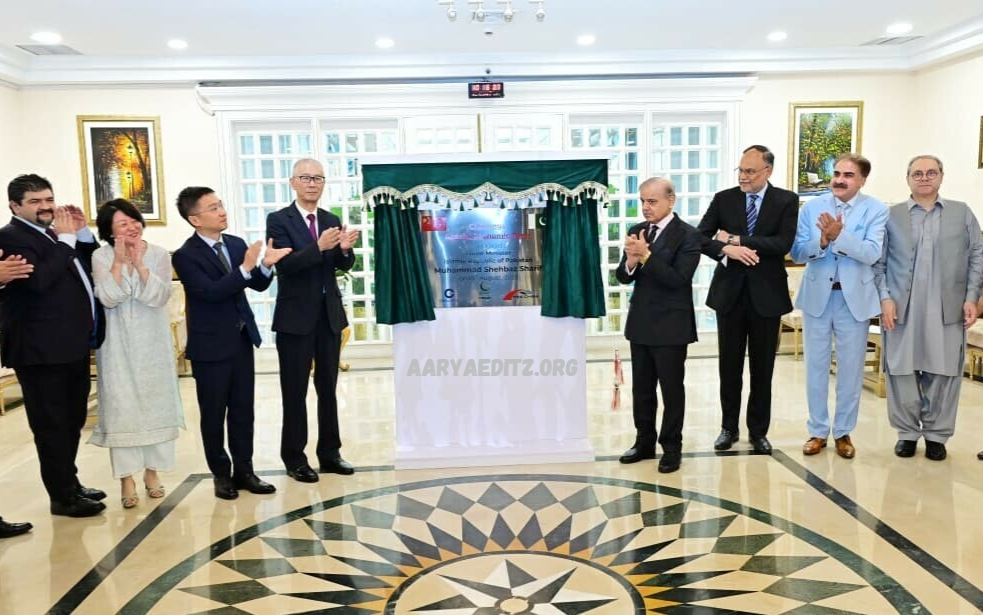Prime Minister Shehbaz Sharif has officially inaugurated the Chinese Textile Groups Economic Zone, marking a significant milestone in Pakistan’s economic and industrial growth. The launch of this state-of-the-art economic zone underscores the government’s commitment to fostering industrial collaboration with China and enhancing the country’s manufacturing capabilities.
The new economic zone is designed to provide modern infrastructure, streamlined business processes, and an investor-friendly environment. It will serve as a hub for innovation, technology transfer, and high-quality production, helping local businesses compete on a global scale.
Experts believe that the Chinese Textile Groups Economic Zone will not only enhance industrial output but also improve Pakistan’s overall economic landscape. Through strategic planning, skilled workforce development, and international cooperation, the initiative lays the groundwork for a new era of growth and competitiveness in the country’s textile and manufacturing sectors.
Prime Minister Shehbaz Inaugurates Chinese Textile Groups’ Economic Zone
Prime Minister Shehbaz Sharif officially inaugurated the Chinese Textile Groups Economic Zone, a landmark initiative aimed at strengthening Pakistan’s textile industry. The project is expected to create thousands of jobs, attract foreign investment, and enhance the country’s export capacity. With modern infrastructure and an investor-friendly environment, the economic zone marks a significant step toward boosting industrial growth and fostering stronger economic ties with China.
Boosting Pakistan’s Textile Industry Through Strategic Collaboration
The launch of the Chinese Textile Groups Economic Zone represents a major step in strengthening Pakistan’s textile sector through international collaboration. By partnering with Chinese investors and industrial experts, the project aims to introduce advanced technology, modern production techniques, and efficient business practices.
This collaboration is expected to enhance the quality and competitiveness of Pakistani textiles in global markets, helping local manufacturers expand their reach while creating new opportunities for workers and entrepreneurs. Through such strategic partnerships, Pakistan is positioning itself as a hub for innovation and growth in the textile industry.
Creating Jobs and Attracting Foreign Investment
The Chinese Textile Group’s Economic Zone is expected to generate thousands of job opportunities, providing employment for both skilled and unskilled workers. At the same time, the project aims to attract substantial foreign investment, thereby boosting Pakistan’s industrial growth and enhancing its economic stability. By offering an investor-friendly environment and modern facilities, the economic zone encourages both local and international businesses to invest in the country’s textile and manufacturing sectors.
Modern Infrastructure for Industrial Growth
The economic zone is equipped with state-of-the-art infrastructure designed to support large-scale industrial operations. From advanced production facilities to efficient logistics and supply chain systems, the zone provides everything businesses need to operate smoothly. This modern setup ensures higher productivity, improved quality standards, and a competitive edge for Pakistani textile products in the international market.
Strengthening Pakistan-China Economic Ties
The project highlights the growing economic cooperation between Pakistan and China. By fostering industrial partnerships and encouraging joint ventures, the economic zone strengthens bilateral trade and investment. This collaboration not only benefits the textile sector but also sets a precedent for future projects that can drive long-term economic growth and strategic cooperation between the two countries.
Frequently Asked Questions
What industries will operate in the zone?
Primarily textile manufacturing, including spinning, weaving, and garment production, along with supporting industries.
Will small businesses benefit from this project?
Yes, small and medium enterprises will gain access to advanced technology, infrastructure, and training opportunities to grow their businesses.
How will the zone impact Pakistan’s exports?
By improving product quality and competitiveness, the zone will increase textile exports to international markets, generating foreign revenue.
What kind of jobs will the economic zone create?
It will create opportunities for skilled and unskilled workers, including roles in manufacturing, management, logistics, and technical operations.
When will the economic zone become fully operational?
The timeline is dependent on phased development, but the inauguration marks the beginning of operations, with full functionality expected to be expanded over the coming years.
Conclusion
The inauguration of the Chinese Textile Groups Economic Zone by Prime Minister Shehbaz Sharif marks a transformative step for Pakistan’s textile industry and overall economy. By combining modern infrastructure, technological innovation, and international collaboration, the project is set to create thousands of jobs, attract foreign investment, and strengthen Pakistan’s position in global markets.

